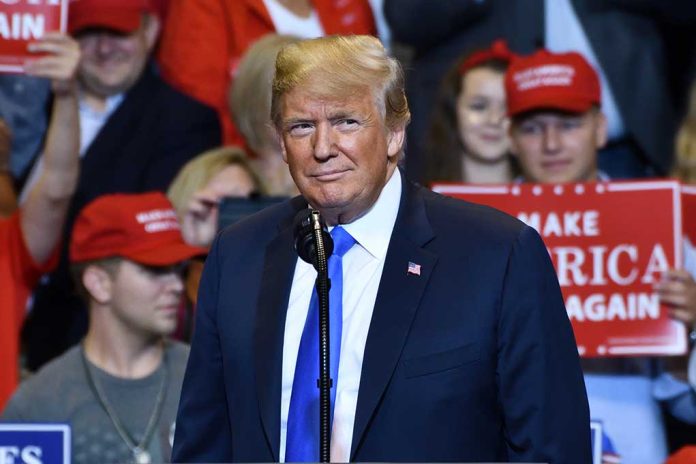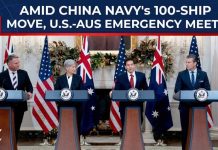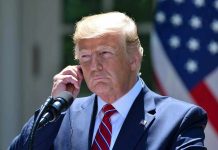
President Trump appoints Vice Admiral Brad Cooper as new CENTCOM Chief, making history as the first Navy admiral to lead this critical Middle East command since its inception over 40 years ago.
Key Takeaways
- President Trump has nominated Vice Admiral Brad Cooper to lead U.S. Central Command (CENTCOM), making him the first Navy admiral to hold this position since CENTCOM’s creation in 1983.
- Cooper, who played a key role in operations against Houthi militants in Yemen, has pioneered the use of AI, armed drones, and unmanned vessels in military operations.
- Air Force Lt. Gen. Dagvin Anderson has been nominated to lead U.S. Africa Command (AFRICOM), becoming the first Air Force officer to head this command.
- Both nominations reflect Trump’s commitment to restoring stability in the Middle East and addressing ongoing conflicts in strategically important regions.
- If confirmed by the Senate, both Cooper and Anderson would receive their fourth star as they take command of these critical military posts.
Historic Navy Leadership for CENTCOM
In a significant shift for U.S. military leadership, President Trump has nominated Vice Admiral Charles “Brad” Cooper II to become the next commander of U.S. Central Command. Cooper, currently serving as CENTCOM’s deputy commander, would make history as the first Navy admiral to lead this crucial command since its establishment in 1983. The Pentagon announced this nomination alongside other key military leadership changes that signal the President’s strategic vision for addressing global security challenges, particularly in the volatile Middle East region.
“Nominated Vice Adm. Charles Cooper to become the next chief of U.S. Central Command, according to the Pentagon,” Said President Trump.
Cooper brings extensive operational experience as a surface warfare officer with previous command of U.S. 5th Fleet and U.S. Naval Forces Central Command. His nomination represents a strategic choice by the Trump administration, emphasizing naval expertise in a region where maritime security, particularly in the Persian Gulf and Red Sea, has become increasingly critical. Cooper would replace General Michael “Erik” Kurilla, who is expected to retire after successfully defending Israel against Iranian attacks during his tenure.
Cooper’s Record of Innovation and Counter-Terrorism
Vice Admiral Cooper has distinguished himself through his leadership in the U.S. bombing campaign against Houthi militants in Yemen, overseeing approximately 100 strikes targeting their drone and missile capabilities. Beyond conventional military operations, Cooper has been at the forefront of military modernization, implementing artificial intelligence, armed drones, and uncrewed vessels to enhance operational effectiveness in the region. This commitment to technological advancement represents a forward-thinking approach to addressing complex regional threats.
“”Brad” Cooper II was nominated to lead CENTCOM, which oversees U.S. forces and operations across the Middle East and central Asia, according to Vice Adm. Charles.
Cooper’s involvement in constructing a humanitarian pier off Gaza demonstrates his understanding of the multifaceted nature of modern military leadership, balancing combat operations with humanitarian considerations. This experience will prove valuable as President Trump pursues his stated goal to “quickly restore stability in the Middle East” amid ongoing conflicts in Gaza and uncertain relations with Iran. The President has expressed optimism about potential ceasefire agreements and finding common ground with Iran on certain issues.
New Leadership for Africa Command
Alongside Cooper’s nomination, President Trump has appointed Air Force Lt. Gen. Dagvin R.M. Anderson to lead U.S. Africa Command. Anderson, currently serving as the director of Joint Force Development (J-7), would become the first Air Force officer to head AFRICOM if confirmed by the Senate. His background includes extensive experience commanding special operations units and flying KC-135 Stratotanker jets, providing him with unique qualifications to address the complex security challenges across the African continent.
Both Cooper and Anderson would receive their fourth star upon Senate confirmation, elevating them to the highest ranks of military leadership. These nominations reflect President Trump’s commitment to placing experienced, innovative leaders in positions overseeing regions of critical strategic importance to American national security interests. As the President works to “return the world to peace,” these commanders will play pivotal roles in implementing his vision for global stability and advancing American interests abroad.
Strategic Priorities and Regional Challenges
CENTCOM’s area of responsibility remains a focal point for the Trump administration as it confronts ongoing challenges including the war in Gaza, Iran’s nuclear ambitions, and persistent terrorist threats across the Middle East and Central Asia. Cooper’s appointment signals a continued emphasis on maritime security and technological innovation in addressing these complex regional issues. His extensive experience in the region provides a strong foundation for implementing the President’s strategic priorities of restoring stability and advancing American interests.
“quickly restore stability in the Middle East,” Said President Donald Trump.
Similarly, AFRICOM faces significant challenges including terrorist insurgencies, great power competition with China and Russia, and regional instability across parts of Africa. Anderson’s background in special operations and joint force development equips him to address these multifaceted threats while advancing American security interests on the continent. These nominations collectively represent President Trump’s strategic approach to military leadership, emphasizing innovation, experience, and a commitment to advancing peace through strength.




